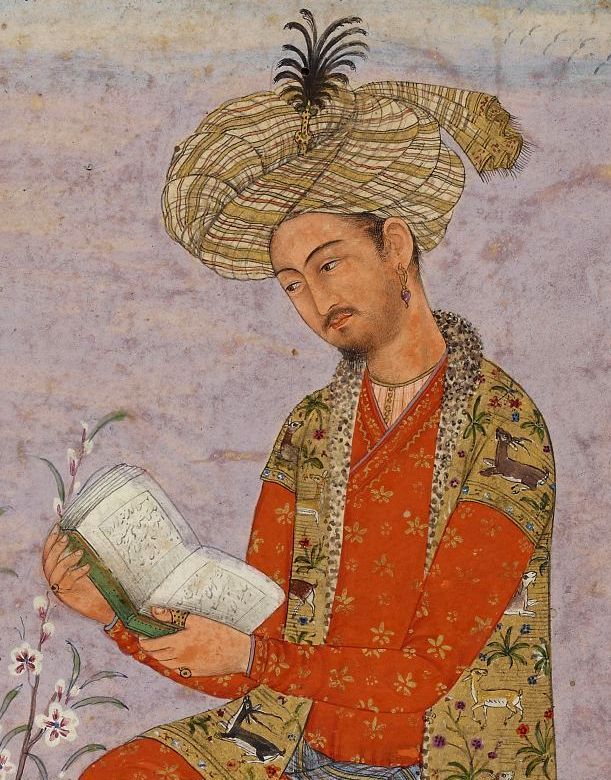“My own soul is my most faithful friend. My own heart, my truest confidant.”
"History of India" at Amazing World http://www.amworld.info/india-travel/history-of-india
Zāhir ud-Dīn Mohammad, comumente conhecido como Babur , foi um imperador muçulmano da Ásia Central que fundou a dinastia Mogol da Índia. Ele era um descendente direto de Tamerlão e acreditava ser também um descendente de Gengis Khan pelo lado materno. Wikipedia

“My own soul is my most faithful friend. My own heart, my truest confidant.”
"History of India" at Amazing World http://www.amworld.info/india-travel/history-of-india
“If you desire to rule and conquer, you don't just fold your hands when things go wrong, you act.”
"History of India" at Amazing World http://www.amworld.info/india-travel/history-of-india; it is not clear in the source cited that this is a quote of Babur — it might be a comment made about him.
Disputed
https://archive.org/stream/baburnama017152mbp/baburnama017152mbp_djvu.Txt
aur pahlu mein wah dair baqi hai
Hadiqah-i-Shuhadã by Mîrza Alî Jãn,, cited by Dr. Harsh Narain, "Rama-Janmabhumi Temple: Muslim Testimony", 1990, and quoted in Goel, S.R. Hindu Temples - What Happened to them.
Quotes from Muslim histories of early modern era
First Mughal emperor Babur wrote in his autobiography Tuzk-e-Babri
Baburnama, Translated from the Hindi version by S.A.A. Rizvi included in Mughal Kãlîna Bhãrata: Bãbur, Aligarh, 1960, In Goel, S.R. Hindu Temples - What happened to them
Babur-Nama, translated into English by A.S. Beveridge, pp. 554-5. https://archive.org/stream/baburnama017152mbp#page/n623/mode/2up/search/dashed Also cited in Harsh Narain, The Ayodhya Temple Mosque Dispute: Focus on Muslim Sources
quoted from Lal, K. S. (1999). Theory and practice of Muslim state in India. New Delhi: Aditya Prakashan. Chapter 4
Babur-Nama, translated into English by A.S. Beveridge, New Delhi reprint, 1979, pp. 574-75
As quoted in The Baburnama : Memoirs of Babur, Prince and Emperor, as translated by Wheeler M. Thackston (2002), p. xxvii
Quote from Bevridge translation of the Baburnama https://archive.org/stream/baburnama017152mbp#page/n663/mode/2up
Babur writing about the battle against the Rajput Confederacy led by Maharana Sangram Singh of Mewar. In Babur-Nama, translated into English by A.S. Beveridge, New Delhi reprint, 1979, pp. 547-572.
https://archive.org/stream/baburnama017152mbp/baburnama017152mbp_djvu.txt
Muraqqa-i-Khusrawî (Tãrîkh-i-Awadh) by Shykh Azmat Alî Kãkorwî Nãmî , cited by Dr. Harsh Narain, "Rama-Janmabhumi Temple: Muslim Testimony", 1990, and quoted in Goel, S.R. Hindu Temples - What Happened to them.
According to Harsh Narain, the publication of the chapter "dealing with the Jihad led by Amir Ali Amethawi for recapture of Hanuman Garhi from the Bairagis" was suppressed "on the ground that its publication would not be opportune in view of the prevailing political situation". Dr. Kakorawi himself lamented that ‘suppression of any part of any old composition or compilation like this can create difficulties and misunderstandings for future historians and researchers’. Muraqqa-i-Khusrawî (Tãrîkh-i-Awadh) by Shykh Azmat Alî Kãkorwî Nãmî. Shykh Azamat Ali Kakorawi Nami (1811–1893), Muraqqa(h)-i Khusrawi also known as the Tarikh-i Av(w)adh cited by Harsh Narain The Ayodhya Temple Mosque Dispute: Focus on Muslim Sources, 1993, New Delhi, Penman Publications. ISBN 8185504164 Quoted in Dr. Harsh Narain: Rama-Janmabhumi Temple Muslim Testimony Harsh Narain (Indian Express, February 26, 1990) and in Shourie, A., & Goel, S. R. (1990). Hindu temples: What happened to them.
Quotes from Muslim histories of early modern era
Baburnama https://archive.org/stream/baburnama017152mbp#page/n551/mode/2up, translated by Annette Beveridge
Babur-Nama, translated into English by A.S. Beveridge, New Delhi reprint, 1979, pp. 370-71.
Babur-Nama, translated into English by A.S. Beveridge, New Delhi reprint, 1979, pp. 572-73